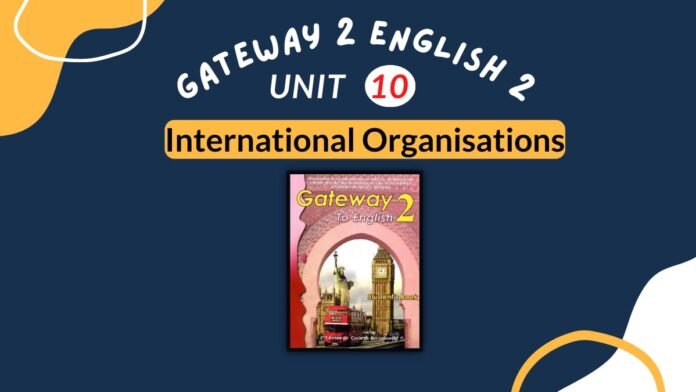This post provides an overview of Gateway 2 Unit 10 International Organizations, including vocabulary related to international organizations, their acronyms, and collocations. It also discusses how to express good and bad news and provides information about phrasal verbs. Additionally, the post includes guidance on writing about comparison and contrast.
TABLE OF CONTENT
- Vocabulary
- Functions: Expressing Good News And Bad News
- Grammar: Phrasal Verbs
- Writing: Expressing Comparison and Contrast
Vocabulary Gateway 2 Unit 10 International Organisations
According to Wikipedia:
An international organization is an organization with a global membership, scope, or presence. There are two main types: governmental and non-governmental organizations. These pages provide fact sheets about some of these organizations.
1- Acronyms (abbreviations) of Famous International Organizations
- UNESCO: United Nations Educational Scientific and Cultural Organisation
- ICESCO: Islamic World Educational, Scientific and Cultural Organization
- UNICEF: United Nations Children’s Emergency Funds
- UNHCR: United Nations High Commissioner for Refugees
- WHO: World Health Organisation
- FAO: Food and Agriculture Organisation
- ICRC: International Committee of the Red Crescent / Cross
- TI: Transparency International
- AI: Amnesty International
- BIS: Bank for International Settlements
- ILO: International Labour Organization
- ITU: International Telecommunication Union
2- Some Collocations Related to International Organisations
NB: Credits for these collocations go to Mr. Bouhout Hamid
- Address global challenges
- Address poverty
- Advocate for gender equality
- Combat climate change
- Combat corruption
- Combat cyber threats
- Combat disease
- Combat piracy
- Combat terrorism
- Combat trafficking
- Conduct peace negotiations
- Coordinate aid
- Coordinate disaster response
- Declare a ceasefire
- Deliver emergency relief
- Ensure nuclear non-proliferation
- Ensure security
- Enhance bilateral relations
- Enhance cooperation
- Establish diplomatic ties
- Facilitate cultural exchange
- Facilitate dialogue
- Facilitate diplomatic talks
- Facilitate international trade
- Facilitate peace
- Facilitate trade
- Foster economic cooperation
- Give a farewell speech
- Hold a summit
- Implement sanctions
- Maintain peace
- Monitor compliance
- Monitor human rights
- Negotiate a peace treaty
- Negotiate treaties
- Offer financial assistance
- Organize a fundraising campaign
- Promote democracy
- Promote education
- Promote equality
- Promote global health initiatives
- Promote sustainable development
- Provide assistance
- Provide humanitarian aid
- Recruit volunteers
- Restore order
- Run a campaign
- Settle a dispute
- Spearhead peacekeeping efforts
- Strengthen international security
- Strengthen ties
- Support refugees
- Veto a decision
3- Other Vocabulary Related to International Organizations
Officials (persons)
- Spokesman
- deputy
- diplomat
- vice president
- commissioner
- ambassador
- secretary-general
Documents
- Charter
- resolution
- report
- declaration
- constitution
Establishment (places)
- Assembly general
- headquarters
- congress
- court
- council
Functions: Expressing Good News And Bad News
Telling Bad and Good News
Telling Bad News
- I feel sad to tell you that…………
- I am sorry to tell you such bad news, but…………….
- I know it’s bad news, but…………….
- pull yourself together, ……………..
- I’ve got a bit of bad news to tell you……
- I have some bad news for you………
Telling Good News
- You won’t believe such good news, ……………….
- I have some joyful news for you, ………………
- I have some excellent news to tell you…………
- I’ve got a bit of good news to tell you……
Responding to Good News
- Sounds great
- My goodness
- That sounds like great news!
- Superb
- Congratulations
- Great news
- I’m glad to hear that!
- You cannot imagine how glad I am to hear such great news
- Are you kidding
- I can’t believe it
- What fantastic news!
- Really?
- Incredible
Responding to Bad News
- Sorry to hear that
- Oh, my Lord
- I’m sorry to hear such bad news.
- You cannot imagine how sad I am to hear such bad news
- Are you kidding
- I can’t believe it
- That must be terrible
- Really
Grammar: Phrasal Verbs
Phrasal verbs consist of verbs and particles (prepositions, adverbs). The particle can change the meaning of the verb altogether. For example::
- look up – consult a reference book (look a word up in a dictionary)
- look for – seek (look for her ring)
- look forward – anticipate with pleasure (look forward to meeting someone)
To fully understand this lesson, look at it here: PHRASAL VERBS.
Writing: Expressing Comparison and Contrast
Comparison: Expressing Similarities
Comparing something to something else or someone to someone else can be done with different linking words. Here are some examples:
- Both Mohamed and Mariam love cats (It means that Mohamed loves cats and Mariam loves cats too.
- He is a doctor like his father. (It means that both the son and the father are doctors)
- He is our teacher and, likewise, our friend.
- Her way of thinking is similar to her sister’s.
- Her way of thinking is the same as her sister’s.
- He’s a comedian who also does magic.
- Nobody loves you as your parents do.
Comparison: Expressing Contrast
- I like to eat fish but not to catch them.
- It was raining, but/ yet/ and yet, Ann went out without an umbrella.
- Although /Though/ Even though it was raining, Ann went out without an umbrella.
- Despite / In spite of the rain, Ann went out without an umbrella.
- It was raining; however, / nevertheless,/ nonetheless, Ann went out without an umbrella.
Life in the past 100 years and now
Life has changed significantly in the past century. Although people still wake up, go to work or school, and spend time with loved ones, the way they do these things has transformed drastically. In contrast to 100 years ago, people now have access to technology that allows them to communicate with others instantly, no matter the distance. However, people often had more face-to-face interactions and a stronger sense of community back then. Nowadays, we have a wider range of job opportunities and a higher standard of living, but we also face different challenges, such as social media addiction and increased environmental concerns. Despite the differences, it is essential to recognize the similarities between the two eras and appreciate the progress that has been made.




[…] exercises are meant to be Unit International Organisations Review, which is part of Gateway 2 English 2 textbook. They deal with vocabulary, reading, […]
thank you very much